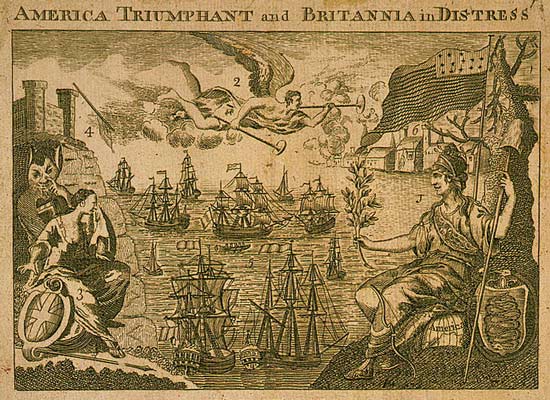The idea of free trade resonated with many Americans. In the wake of the War of Independence, it became the basis for a new style of diplomacy characterized by free and open commerce with all nations. It also became a justification for war with Great Britain.

Library of Congress, Prints and Photographs Division
The notion of “free trade” provided a powerful incitement for some Americans to support war with Great Britain. Advocates of free trade promoted the opening of commerce among all nations without government-imposed restrictions or barriers. In wartime, free trade meant neutral ships would be left alone to trade without restraint, including with belligerents or their allies. From an American perspective, Britain’s early nineteenth century restrictions on sea trade represented an economic impediment to commerce and an insult to national honor.
Enthusiasm for free trade dated back to the American War for Independence. In the 1770s, trade rivalries formed one of the root causes of that conflict. After the American victory, free-trade advocates argued America could usher in a new kind of diplomacy characterized by commercial treaties and reciprocity rather than military alliances. In due course, advocates hoped, opening up trade would eliminate wars and bring prosperity to all nations.
But when France declared war on Britain, reality sank in. Some Britons mistakenly imagined Americans would choose their side, linking Britain with liberty and Napoleon with tyranny.
Instead, over time America determined to steer a more neutral course on the high seas, enraging many Britons. One popular pamphlet decried the “fraud’ of American neutral flags as an ungrateful act of war. The pamphlet argued American “free trade” benefited Napoleonic France at Britain’s expense, and allowed unprincipled neutrals to profit “unduly by the war.”
As France and Great Britain initiated a policy of commercial warfare in 1805, both sides took a tougher stance against neutral commerce. Beginning in 1807, Britain clamped down on the neutral trade, subjecting American vessels to mandatory inspections at British ports. Between 1807 and 1812, the British and French would seize over 900 American vessels.
In the wake of the 1807 Chesapeake-Leopard Affair, Britain’s hard line against neutral trade launched a new round of pro-war rhetoric in America. Ironically, the peaceful principles of “free trade with all the world” acted as a catalyst to war. The lynchpin of America’s foreign policy served to underscore the unfinished business of the American Revolution, priming the two old adversaries for a second round of hostilities in 1812.
Last updated: August 23, 2017
